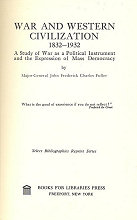
FULLER : War and western civilization (előszó)
To those who read between the lines,
There's food indeed—for those who read.
BEFORE he begins this book I will ask the reader to turn to the Appendix and glance through it. Then I will ask him to put himself this question : "Is it worth while?" And then another : "Is what worth while?" To me, the answer to this second question is, modern democracy—that is "demagogy"; not the will of the people but their emotions which have provided the driving force of the last hundred years and the "drug" which has hallucinated them with war. Is it necessary to love peace so ardently that in order to settle every political problem of importance we must tear each other to pieces like hyenas in rut? If so, then we are animals, and this appears to me to be the fundamental and hidden disease of Western civilization. Yet, cannot we open our eyes and become as gods, and take of the tree of life in place of the tree of death? For be it remembered, though energy can destroy it can also create.
The next point I will ask the reader to consider is this : Since 1832 the world has been transformed in one direction. This transformation has been stupendous, bewildering, magical; yet it has been almost entirely material. This age has not been pre-eminent in art or in religion; science has probed into the outer world and has revealed to us a new universe; but still the inner world remains all but unexplored. Science has analysed and weighed the stars; yet the human soul remains a mystery, a hidden and seemingly unfathomable secret. All this has taken place in the span of one long life. This book opens at the time when my father was born; when his father was born, the Bastille was still standing, and Napoleon, a poverty-stricken sub-lieutenant of artillery, was cutting down his frugal meals in order that he might buy candles to light his studies of great books on war. In one hundred years, or at most one hundred and forty-four, we have this stupendous change in one direction. Is not it equally possible for us to effect as stupendous a change in another? Is not this the problem of the hundred years which now faces us? And is not one of the clues which will assist us as we advance into this shrouded labyrinth to be found in the words of Frederick the Great : "What is the good of experience if you do not reflect?"
Here then is the object of this book: To reflect on the experiences of the last hundred years in order that we may fashion a little candle which will light our way through the next hundred; a flickering flame which will cast a glimmer here and there on the bindings of the great books on war which this century will see published; a glimmer which will make it possible for us to read their titles, and by reading them enable future generations, who lift them from their shelves, to open them and to read within: "This war was avoided through the wisdom of our ancestors." That, studious reader, is a noble text.
To be bound by tradition, to live in a groove and trickle down the gutter of life is to blaspheme against the Spirit of the Age, that spirit which we call "Progress"; that intangible all-compelling force which drives the peoples on into the unknown of future history. To grasp the skirts of this spirit is to become wise and understanding; but to grasp them demands courage and truthfulness. Let me say with modesty that these twin virtues have been my guiding stars. That this book should be without blemish is absurd to expect; no man can examine the last hundred years without making mistakes. It is not accuracy which in itself is virtuous but the courage and the truthfulness expended in its seeking.
This age, in my mind, is an age of spiritual decay, an age of saurian materialism. I stand before Magic, yet I see little of God. There is an essential ugliness in it which must give way to beauty; a yawning chasm of selfishness which must be filled up by right-mindedness. Praise I frequently withhold; for praise is a mighty stimulant, and over much of it kills like strychnine. Democracies are founded upon praise, the praise of colossal numbers, gigantic size, immense genius, bullet-proof heroes, ecstatic heroines and all the glittering servitors of the magician's trade; for it fascinates the herd to discover in others qualities it does not itself possess. Until these phantoms vanish, until this black magic is smitten low, all I see in the crystal of the future is this: the engine of Western civilization, speeding along the lines of narrow thoughts, roaring towards the Abyss.
J. F. C. F.
September 9, 1932.